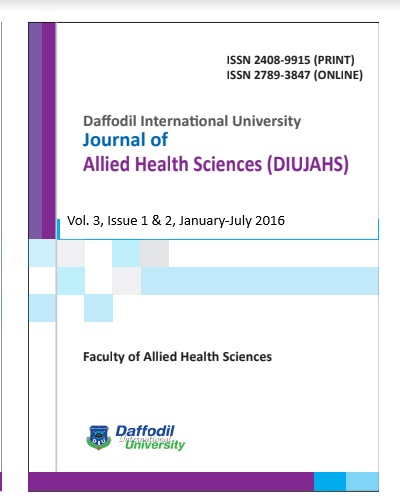Evaluation of in Vivo Antidiabetic and Antibacterial Potential of A Mangrove Plant- Pandanus Foetidus
DOI:
https://doi.org/10.36481/diuhls.v03i1-2.5sd8dc31Keywords:
Pandanus foetidus, Glibenclamide, Streptococcus pyogenAbstract
Pandanus foetidus commonly known as Kewakata is a mangrove plant. This plant has a history of being used among the folk society in diabetic patients in coastal area and for the treatment of various diseases. The present study was aimed to evaluate the anti diabetic and antibacterial potential of P. foetidus. For this study, aerial root parts were used. Antidiabetic activity was assayed against streptozotocin (STZ) induced experimental rats and antibacterial activity was found against 10 bacterial species by disc diffusion method. Streptozotocin induced rats were at first administered to the ethanolic extract. Glibenclamide was used as a standard drug for antidiabetic activity evaluation. Blood glucose levels were determined after oral administration of a dose of P. foetidus (400 mg/kg body. weight) in diabetic groups. Blood glucose levels were determined on 0, 7th, 14th and 21st day after oral administration of the extract (400 mg/kg). The extract was found to reduce blood sugar in streptozotocin induced diabetic rats. Reduction in blood sugar could be seen from 7th day after continuous administration of the extract. The ethanolic extract showed observable antibacterial activity against the bacterial strains Streptococcus pyogens, Salmonella typhi, Escherichia coli & Pseudomonus spp. where Kannamycin was used as standard drug. These results indicated that P. foetidus possess a hypoglycemic and antibacterial effect specially the aerial root parts.

